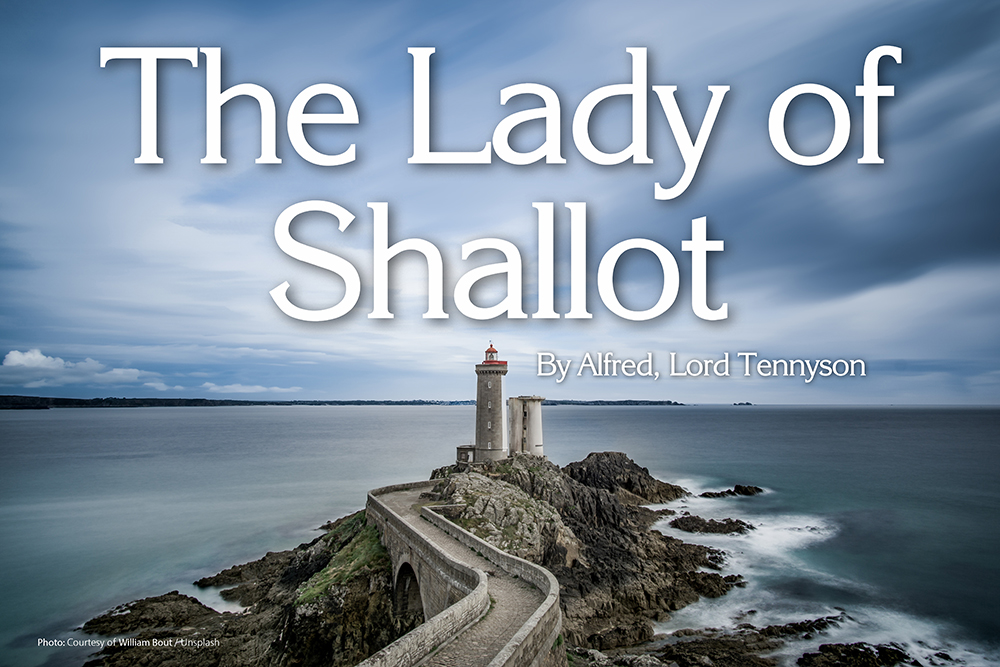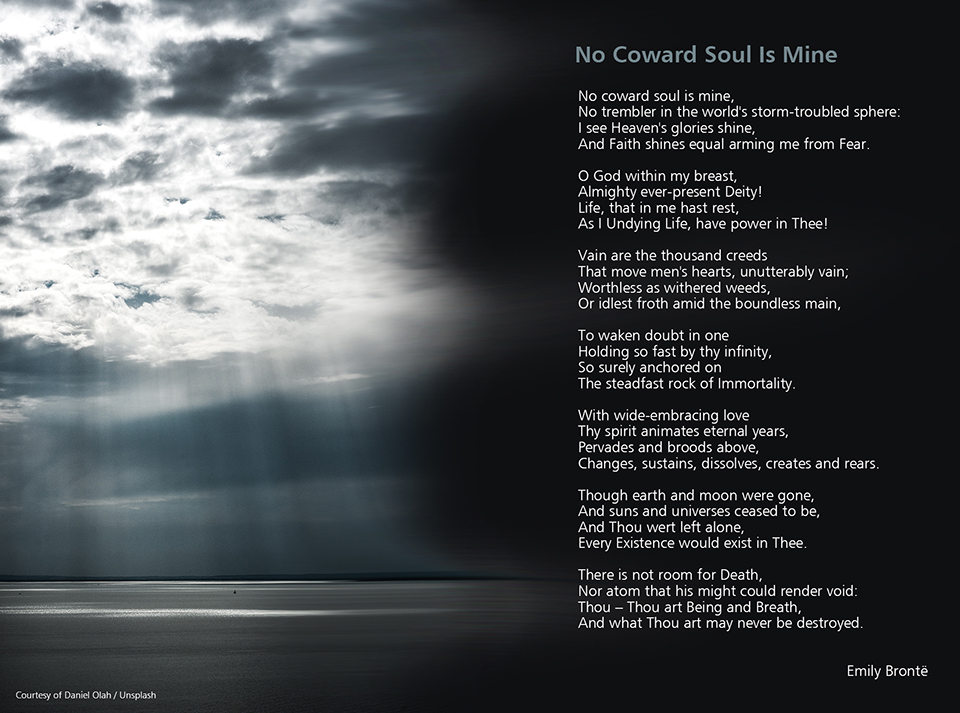William Shakespeare (1564–1616)

Charlie Chaplin (1889–1977)

As I began to love myself
I found that anguish and emotional suffering
are only warning signs that I was living
against my own truth.
Today, I know, this is Authenticity.
As I began to love myself
I understood how much it can offend somebody
if I try to force my desires on this person,
even though I knew the time was not right
and the person was not ready for it,
and even though this person was me.
Today I call this Respect.
As I began to love myself
I stopped craving for a different life,
and I could see that everything
that surrounded me
was inviting me to grow.
Today I call this Maturity.
As I began to love myself
I understood that at any circumstance,
I am in the right place at the right time,
and everything happens at the exactly right moment.
So I could be calm.
Today I call this Self-Confidence.
As I began to love myself
I quit stealing my own time,
and I stopped designing huge projects
for the future.
Today, I only do what brings me joy and happiness,
things I love to do and that make my heart cheer,
and I do them in my own way
and in my own rhythm.
Today I call this Simplicity.
As I began to love myself
I freed myself of anything
that is no good for my health –
food, people, things, situations,
and everything that drew me down
and away from myself.
At first I called this attitude a healthy egoism.
Today I know it is Love of Oneself.
As I began to love myself
I quit trying to always be right,
and ever since
I was wrong less of the time.
Today I discovered that is Modesty.
As I began to love myself
I refused to go on living in the past
and worrying about the future.
Now, I only live for the moment,
where everything is happening.
Today I live each day,
day by day,
and I call it Fulfillment.
As I began to love myself
I recognized
that my mind can disturb me
and it can make me sick.
But as I connected it to my heart,
my mind became a valuable ally.
Today I call this connection Wisdom of the Heart.
We no longer need to fear arguments,
confrontations or any kind of problems
with ourselves or others.
Even stars collide,
and out of their crashing, new worlds are born.
Today I know: This is Life!
Alfred, Lord Tennyson (1809–1892)

Part I
On either side the river lie
Long fields of barley and of rye,
That clothe the wold and meet the sky;
And thro’ the field the road runs by |
To many-tower’d Camelot;
And up and down the people go,
Gazing where the lilies blow
Round an island there below,
The island of Shalott.
Willows whiten, aspens quiver,
Little breezes dusk and shiver
Thro’ the wave that runs for ever
By the island in the river
Flowing down to Camelot.
Four gray walls, and four gray towers,
Overlook a space of flowers,
And the silent isle imbowers
The Lady of Shalott.
By the margin, willow veil’d,
Slide the heavy barges trail’d
By slow horses; and unhail’d
The shallop flitteth silken-sail’d
Skimming down to Camelot:
But who hath seen her wave her hand?
Or at the casement seen her stand?
Or is she known in all the land,
The Lady of Shalott?
Only reapers, reaping early
In among the bearded barley,
Hear a song that echoes cheerly
From the river winding clearly,
Down to tower’d Camelot:
And by the moon the reaper weary,
Piling sheaves in uplands airy,
Listening, whispers ” ‘Tis the fairy
Lady of Shalott.”
Part II
There she weaves by night and day
A magic web with colours gay.
She has heard a whisper say,
A curse is on her if she stay
To look down to Camelot.
She knows not what the curse may be,
And so she weaveth steadily,
And little other care hath she,
The Lady of Shalott.
And moving thro’ a mirror clear
That hangs before her all the year,
Shadows of the world appear.
There she sees the highway near
Winding down to Camelot:
There the river eddy whirls,
And there the surly village-churls,
And the red cloaks of market girls,
Pass onward from Shalott.
Sometimes a troop of damsels glad,
An abbot on an ambling pad,
Sometimes a curly shepherd-lad,
Or long-hair’d page in crimson clad,
Goes by to tower’d Camelot;
And sometimes thro’ the mirror blue
The knights come riding two and two:
She hath no loyal knight and true,
The Lady of Shalott.
But in her web she still delights
To weave the mirror’s magic sights,
For often thro’ the silent nights
A funeral, with plumes and lights
And music, went to Camelot:
Or when the moon was overhead,
Came two young lovers lately wed:
“I am half sick of shadows,” said
The Lady of Shalott.
Part III
A bow-shot from her bower-eaves,
He rode between the barley-sheaves,
The sun came dazzling thro’ the leaves,
And flamed upon the brazen greaves
Of bold Sir Lancelot.
A red-cross knight for ever kneel’d
To a lady in his shield,
That sparkled on the yellow field,
Beside remote Shalott.
The gemmy bridle glitter’d free,
Like to some branch of stars we see
Hung in the golden Galaxy.
The bridle bells rang merrily
As he rode down to Camelot:
And from his blazon’d baldric slung
A mighty silver bugle hung,
And as he rode his armour rung,
Beside remote Shalott.
All in the blue unclouded weather
Thick-jewell’d shone the saddle-leather,
The helmet and the helmet-feather
Burn’d like one burning flame together,
As he rode down to Camelot.
As often thro’ the purple night,
Below the starry clusters bright,
Some bearded meteor, trailing light,
Moves over still Shalott.
His broad clear brow in sunlight glow’d;
On burnish’d hooves his war-horse trode;
From underneath his helmet flow’d
His coal-black curls as on he rode,
As he rode down to Camelot.
From the bank and from the river
He flash’d into the crystal mirror,
“Tirra lirra,” by the river
Sang Sir Lancelot.
She left the web, she left the loom,
She made three paces thro’ the room,
She saw the water-lily bloom,
She saw the helmet and the plume,
She look’d down to Camelot.
Out flew the web and floated wide;
The mirror crack’d from side to side;
“The curse is come upon me,” cried
The Lady of Shalott.
Part IV
In the stormy east-wind straining,
The pale yellow woods were waning,
The broad stream in his banks complaining,
Heavily the low sky raining
Over tower’d Camelot;
Down she came and found a boat
Beneath a willow left afloat,
And round about the prow she wrote
The Lady of Shalott.
And down the river’s dim expanse
Like some bold seër in a trance,
Seeing all his own mischance—
With a glassy countenance
Did she look to Camelot.
And at the closing of the day
She loosed the chain, and down she lay;
The broad stream bore her far away,
The Lady of Shalott.
Lying, robed in snowy white
That loosely flew to left and right—
The leaves upon her falling light—
Thro’ the noises of the night
She floated down to Camelot:
And as the boat-head wound along
The willowy hills and fields among,
They heard her singing her last song,
The Lady of Shalott.
Heard a carol, mournful, holy,
Chanted loudly, chanted lowly,
Till her blood was frozen slowly,
And her eyes were darken’d wholly,
Turn’d to tower’d Camelot.
For ere she reach’d upon the tide
The first house by the water-side,
Singing in her song she died,
The Lady of Shalott.
Under tower and balcony,
By garden-wall and gallery,
A gleaming shape she floated by,
Dead-pale between the houses high,
Silent into Camelot.
Out upon the wharfs they came,
Knight and burgher, lord and dame,
And round the prow they read her name,
The Lady of Shalott.
Who is this? and what is here?
And in the lighted palace near
Died the sound of royal cheer;
And they cross’d themselves for fear,
All the knights at Camelot:
But Lancelot mused a little space;
He said, “She has a lovely face;
God in his mercy lend her grace,
The Lady of Shalott.”
Emily Brontë (1818–1848)



Loved this. Great website that you have. Look up my blog. https://nautisideboatrentals.com/eateries-on-lake-austin/
Great post. Thanks for sharing your knowledge. Check mine out sometime. https://nautisideboatrentals.com/10-ways-to-keep-our-lakes-clean/
I am sure tһis post has touched all the internet viewers, its
really really fastiɗious piеce of writing on ƅuilding up new ᴡeb site.
Thank you Lana for your very kind words!
We are very happy to hear that you like the Cradle!
Cheers!
I absolᥙtely ⅼove your blog and find the
majoгity of yoᥙr post’s to Ƅe what precisely I’m
looking for. Do уou offer guest ԝriters to write content for you personally?
I wouldn’t mind publishing a post or elaborating on a lot of the subjects you write concerning here.
Again, awesome website!
Thank you so much for your kind words.
If we decide to look for contributors, we might contact you.
Thank you again for visiting the Cradle!
Cheers!
“Nothing is permanent in this wicked world, not even our troubles.”